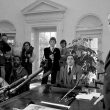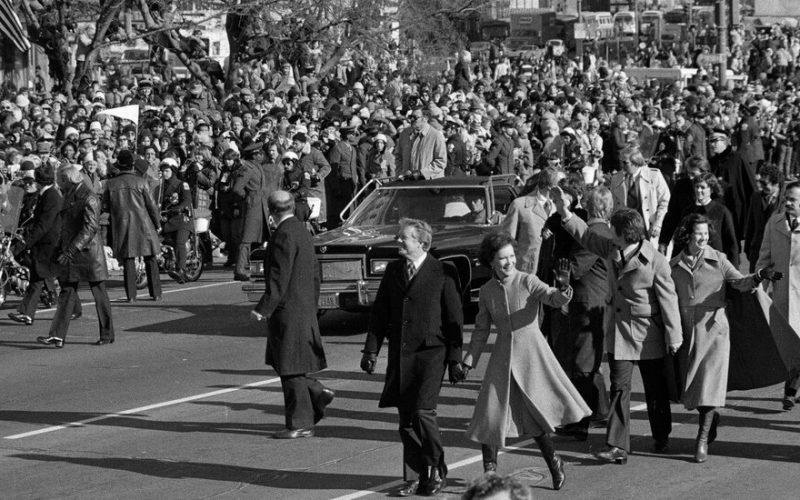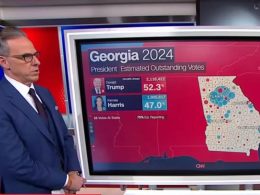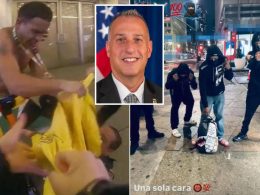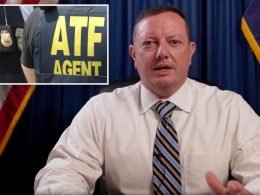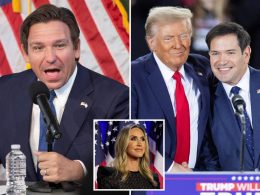Former President Jimmy Carter is set to arrive in Washington on Tuesday to be honored in death as the city never truly honored him in life.
That he will end his long story with a pomp-and-circumstance visit to the nation’s capital is a nod to protocol not partiality, a testament to the rituals of the American presidency rather than a testimonial to the time he presided in the citadel of power.
To put it more bluntly, Mr. Carter and Washington did not exactly get along. More than any president in generations before him, the peanut farmer from Georgia was a genuine outsider when he took occupancy of the white mansion at 1600 Pennsylvania Avenue — and determinedly, stubbornly, proudly remained so.
He never cared for the culture of the capital, never catered to its mandarins and doyens, never bowed to its conventions. The city, in turn, never cared for him and his “Georgian mafia,” dismissing them as a bunch of cocky rednecks from the hinterlands who did not know what they were doing. Other outsider presidents eventually acclimated to Washington. Not Mr. Carter. And by his own admission, it would cost him.
“I don’t know which was worse — the Carter crowd’s distrust and dislike of unofficial Washington or Washington’s contempt for the new guys in town from Georgia,” recalled Gregory B. Craig, a longtime lawyer and fixture in Washington who served in two other Democratic administrations. “I do know it was there on Day 1.”
Between the two camps, the blend of piety, pettiness, jealousy and condescension proved toxic. It was not partisan — Mr. Carter’s most profound differences were with fellow Democrats. But the litany of slights and snubs on both sides was long and lingering. Everyone remembered the phone call that went unreturned, the invitation that never came, the project that was not approved, the appointment that was not offered.
Mr. Carter, after all, had run against Washington when he came out of nowhere to win the presidency in 1976 and unlike others who did that, he really meant it. He vaulted to office as the antidote to Watergate, Vietnam and other national setbacks. He had not come to town to become a creature of it.
He saw the demands of the Washington power structure as indulgent and pointless. He had no interest in dinner at the home of Katharine Graham, the publisher of The Washington Post, and aides like Hamilton Jordan, his chief of staff, and Jody Powell, his press secretary, radiated his disregard.
“Carter’s state funeral in Washington is full of ironies,” said Kai Bird, who titled his 2021 biography of Mr. Carter “The Outlier” for a reason. “He really was an outsider running against the Washington establishment. And when he improbably entered the Oval Office, he declined more than one dinner invitation from the Georgetown set.”
In their conversations for the book, Mr. Bird added, “he later told me he thought that was a mistake. But he preferred pizza and beer with Ham Jordan and Jody Powell — or working late into the night.”
As E. Stanly Godbold Jr., the author of a two-volume biography of Mr. Carter and the first lady Rosalynn Carter, put it: “Carter arrived at the White House virtually unbeholden to anyone except Rosalynn, his family and those millions of people who had voted for him. He had a free hand, within the limits of the Constitution and the presidency, to do as he wished.”
Or so he thought. But what Mr. Carter saw as principled, Washington saw as naïve and counterproductive. The framers conceived a system with checks and balances, but historically it has been lubricated by personal relationships, favors, horse trading and socializing.
“When it came to the politics of Washington, D.C., he never really understood how the system worked,” Thomas P. O’Neill Jr., the House speaker, wrote in his memoir. Mrs. Graham wrote in hers that “Jimmy Carter was one of those outsider presidents who found it difficult to find the right modus operandi for Washington.”
This was an era of giants in Washington, the likes of whom do not exist today. It was a time when titans of law, lobbying, politics and journalism like Joseph A. Califano Jr., Edward Bennett Williams, Ben Bradlee and Art Buchwald would meet for lunch every Tuesday at the Sans Souci to hash over the latest events. Mr. Carter was a frequent topic of discourse, and not always lovingly so.
Mr. Carter got off to a rough start with Mr. O’Neill, a necessary ally to pass any agenda. Shortly after the election, Mr. Carter visited the speaker but seemed dismissive of Mr. O’Neill’s advice about working with Congress, saying that if lawmakers did not go along, he could go over their heads to appeal to voters. “Hell, Mr. President, you’re making a big mistake,” Mr. O’Neill recalled replying.
It got worse when Mr. O’Neill asked for tickets for his family to attend an inaugural eve gala at the Kennedy Center only to discover that his relatives were seated far off in the balcony. Mr. O’Neill called Mr. Jordan the next day to yell at him. He nicknamed the chief of staff “Hamilton Jerkin.” In his memoir, Mr. O’Neill complained that Mr. Jordan and other Carter aides were “amateurs” who “came to Washington with a chip on their shoulder and never changed.”
But if they had a chip, it was fueled by plenty of patronizing quips mocking the Carter team’s Southern roots, including cartoons in the paper portraying them as hayseeds. It did not help that Mr. Carter arrived in a city full of politicians who thought they should have been the one to win in 1976, not this nobody from Georgia.
Mr. Carter styled himself as a man of the people from the start by getting out of his limousine during the inaugural parade to walk down Pennsylvania Avenue. He initially banned the playing of “Hail to the Chief” when he entered a room and sold Sequoia, the presidential yacht often used in the past to woo key congressional leaders.
He took it as a badge of honor to do things that were not politically expedient, like cutting off water projects important to lawmakers trying to deliver for their districts or forcing them to vote on an unpopular treaty turning over the Panama Canal. It did not go over well either when Washington concluded that he did not fight hard enough for Ted Sorensen, the old John F. Kennedy hand, to become C.I.A. director or when he fought with Mr. Califano, the Washington powerhouse serving as secretary of health, education and welfare.
“I believe President Carter tried to make peace when he came into office,” said Chris Matthews, who was a speechwriter for him before going on to work for Mr. O’Neill and then embarking on a long career in television journalism. But “Carter told me he should have done more work getting control of the Democratic Party.” And Mr. Matthews noted that “his challenge in Washington derived from odd places,” like the squabble over the gala seats.
The spats had consequences, both legislatively and politically. Ultimately, he got a lot of his bills through Congress, but not all and not easily. And eventually, he was challenged for the party nomination in 1980 by Senator Edward M. Kennedy of Massachusetts, a challenge that fell short but damaged him for the fall contest that he would lose to former Gov. Ronald Reagan of California.
“His poor relationships with Democrats in both the House and the Senate hindered his ability to drive his agenda through Congress,” said Tevi Troy, a presidential historian at the Ronald Reagan Institute. “In addition, those poor relations hurt his reputation in Washington, as many Democratic members who would ordinarily advocate for the administration in the press were less willing to do so.”
Mr. Carter did not naturally take to the schmoozing that comes with politics. At one point, an aide persuaded him to invite a couple of important senators to play tennis at the White House. He consented, but as soon as the set was done, he headed back into the mansion without chit-chatting or inviting them in for a drink. “You said to play tennis with them, and I did,” Mr. Carter later explained to the disappointed aide.
“Carter didn’t like politics, period,” said Douglas Brinkley, the author of “The Unfinished Presidency,” about Mr. Carter’s much-lauded humanitarian work after leaving office. “And he didn’t like politicians.”
After an official dinner, Mr. Carter would be quick to take his leave. “He would be curt,” Mr. Brinkley said. “He would just get up because he had work to do. He never developed any Washington friendships.”
Mr. Williams was a prime example of a missed opportunity. A founder of the law firm Williams & Connolly, owner of the team then called the Washington Redskins and later of the Baltimore Orioles, and treasurer of the Democratic Party, Mr. Williams was a quintessential capital insider.
But he felt shunned by Mr. Carter. Mr. Williams recalled meeting the future president at the 1976 convention and all he got was “a wet flounder” of a handshake. He was irked that Mr. Carter never came to the Alfalfa Dinner, one of the most exclusive black-tie events on Washington’s social circuit. “Carter’s a candy-ass,” Mr. Williams groused to the president of Georgetown University, according to “The Man to See,” by Evan Thomas.
Only after a couple of years in Washington did the Carter team finally seek Mr. Williams’s help, in this case to quash negative media reports involving Mr. Jordan. When he succeeded, he was invited to a state dinner and Mr. Carter later came to sit in Mr. Williams’s box for a football game at Robert F. Kennedy Memorial Stadium. But Mr. Williams never warmed to Mr. Carter and joined a futile last-minute effort to thwart his nomination at the convention in 1980.
Mr. Carter never warmed to Washington either, calling it an island “isolated from the mainstream of our nation’s life.” After losing re-election, he grappled with his distant relationship with the capital. In “White House Diary,” he cast it largely as a matter of social butterflies resentful of his diffidence rather than something larger.
Rosalynn Carter, Mr. Powell and others, he wrote, had criticized him because “neither I nor my key staff members participated in Washington’s social life,” much to his detriment. “I am sure this apparently aloof behavior drove something of a wedge between us and numerous influential cocktail party hosts,” he wrote. “But I wasn’t the first president to object to this obligation.”
He wrote that he and Mrs. Carter had resolved to avoid going out regularly when he was governor of Georgia “and for better or worse, I never had any intention of changing this approach when we moved into the White House.”
At this point, of course, all of that is ancient history. Washington’s focus on Tuesday will be on the successes of Mr. Carter’s presidency, the inspiration of his post-presidency and the decency of his character. He will be brought by horse-drawn caisson to the Capitol and lie in state. He will be honored at Washington National Cathedral on Thursday.
No matter how Washington feels, it has a way of putting on a great funeral.



